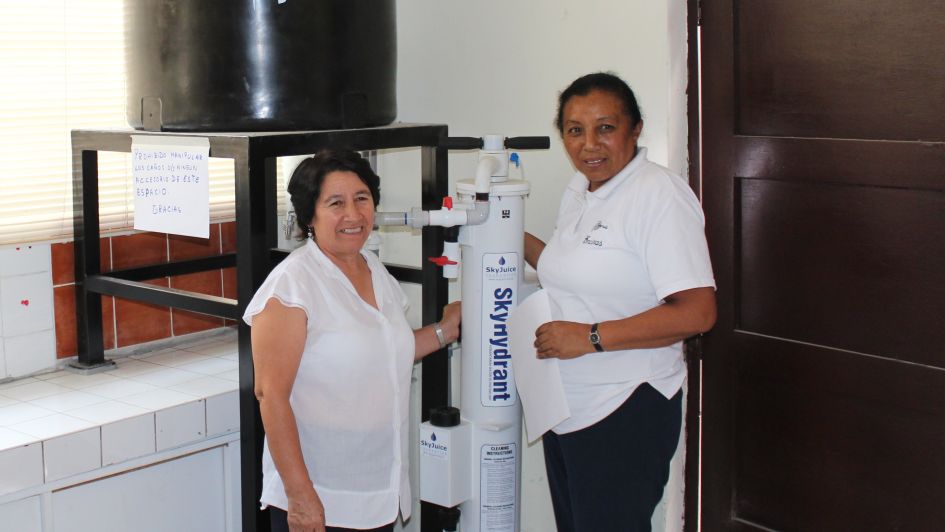Project closed | Project period: 2012
Drinking water for communities and schools
Grid-independent drinking water supply in rural Peru

A hygienic drinking water supply and wastewater disposal system are still not a fact of life for a large part of the Peruvian population. In order to improve the situation for especially underprivileged groups, Siemens Stiftung had joined forces with the German agency for international cooperation Gesellschaft für Internationale Zusammenarbeit (GIZ) to support a project organized by the non-governmental organization Alumbrando.
Working area:
Development cooperation
Region/Country:
Peru
Project period:
2012 (closed)
Drinking water and hygiene trainings
SkyHydrant water filters were installed to supply schools and communities in remote areas of Peru with drinking water. The mobile water filter systems remove suspended solids, impurities, bacteria, and pathogens and are able to purify up to 1,000 liters of raw water per hour without being connected to the electricity grid. In addition, the project raised local awareness of the importance of health and hygiene practices.
Members of the community were informed about the topic of hygiene and trained in operating the filters. They could then pass on their knowledge to others in the community, particularly schools, allowing residents to take charge of the maintenance of the basic technology.
What approach did the initiative take?
Despite sustained economic growth in Peru, social conditions in many rural areas remain precarious. Particularly with drinking water and sanitation, an extreme disparity exists between urban and rural areas: While 90 percent of city dwellers have access to clean water, the ratio for families in the countryside is only about 65 percent.
Siemens Stiftung seeked to improve this situation by collaborating with the Peruvian non-governmental organization Alumbrando and the German agency for international cooperation Gesellschaft für Internationale Zusammenarbeit (GIZ). The goal was to build a hygienic and sustainable drinking water supply using simple technical solutions that work without electricity connections and infrastructure. The project focused on especially remote rural communities: Ayacucho, Ancash, Cusco, Huancavelica, Lima, Loreto, Piura, Puno, and San Martin are among the poorest regions in Peru.
What are the most important elements?
- A grid-independent supply of drinking water through the use of SkyHydrant filters In a first phase, 24 mobile SkyHydrant filters was installed in these communities. These mobile water filter systems work without electricity and are able to purify up to 1,000 liters of water per hour.
- Technical training and knowledge transfer Community leaders were trained to operate the filters so that the project could continue independently. This approach enabled communities to take responsibility for maintaining the filters. The acquired knowledge was also shared with other communities.
- Workshops on health and hygiene Workshops educated the communities on hygiene and preventive healthcare. In schools, conscientious handling of drinking water is an important topic right from the start.






